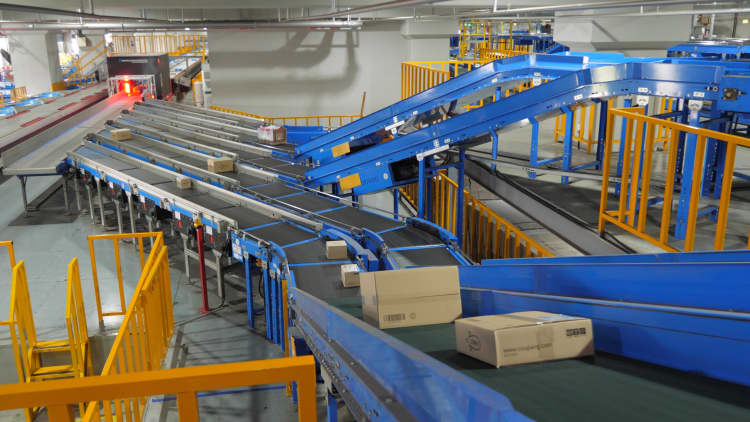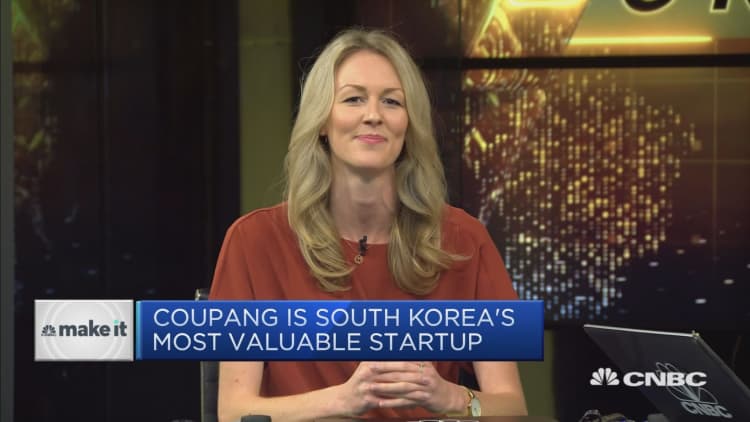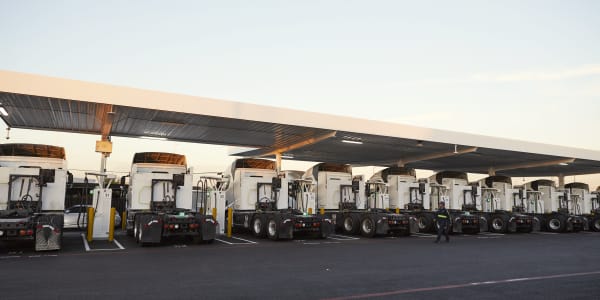South Korea is a sought-after market for e-commerce companies, with one of the highest rates of internet penetration and smartphone adoption in the world, helped by superfast network speeds.
While the market remains fiercely competitive, in just 10 years e-commerce giant Coupang has managed to become the country's most popular online retailer. The Seoul-based company owes its dominant position in part to its slate of fast delivery options, which is powered by its own logistics business, Rocket Delivery. Shoppers can choose from millions of products, many of which are available for overnight or same-day delivery, from fresh produce to tablets. This year it garnered the No. 2 spot on CNBC's 2020 Disruptor 50 list of the world's most innovative companies.
Coupang has inevitably drawn comparisons to Amazon, given its focus on cheap, fast delivery and convenience. The company's slogan — "How did we ever live without Coupang?" — riffs on the same themes as Amazon's focus on "customer obsession," such as delighting customers and eliminating pain points in the online shopping experience. These efforts appear to be working, since more than half of all Koreans have downloaded Coupang's app, the company says.
More from Disruptor 50:
Meet the 2020 CNBC Disruptor 50 companies
The technology that will dominate daily life on the other side of coronavirus
Opportunity missed: Why there are no Black CEOs on this year's list
Like Amazon, Bom Kim, founder and CEO of Coupang, realized early on the importance of controlling the delivery process. The company has invested millions on building out its own end-to-end logistics network, which includes 200 warehouses spanning 20 million sq. ft. across the country, as well as trucks and thousands of delivery drivers.
The company says 70% of Koreans live within 10 minutes of a Coupang logistics center, making last-mile delivery easier to achieve. It's also helped by the fact that South Korea is one of the world's most densely populated countries.
Last year Coupang further accelerated delivery speeds when it launched Dawn Delivery, which promises to drop off packages on shoppers' doorsteps by 7 a.m. as long as they place the order by midnight the day before. That's even faster than Amazon's next-day delivery, which has a noon cutoff time.
"The key hurdle always has been the time it takes from leaving the warehouse to arriving at the customer's door," said Michelle Evans, the senior head of digital consumer at Euromonitor International. "[Coupang] has built out a pretty robust network to get those delivery times down."
Coupang's logistics investments have paid off, as 99.3% of orders placed on its site are delivered within one day, the company said. Coupang now delivers 3.3 million items each day, up from an average of 2.2 million units per day at the end of 2019.
In recent months Coupang has weathered its fair share of challenges due to the coronavirus pandemic. While they were asked to stay home, millions of South Koreans turned to online shopping more than before to order essentials like face masks and hand sanitizer.
Coupang in January was hit with a wave of disruptions to its supply chain, prices and logistics capacity, fueled by widespread panic buying, the company said. On top of that, it faced an outbreak of coronavirus cases at a warehouse near Seoul, fueling concerns that it failed to enact adequate safety measures. Coupang maintains it provided workers with gloves and masks every day, disinfected facilities, as well as implemented temperature checks and "testing and tracing protocols."
The company quickly managed the deluge of orders and not only maintained service levels but also improved them in some areas, Coupang said. As order volume surged, it expanded overnight and same-day delivery to more items, like consumables and fresh food. The company also opened a new logistics center in March, which increased its capacity to fulfill orders.

SoftBank ties
Coupang is said to be valued at $9 billion and has drawn $3.4 billion in venture capital funding to date, including an investment of $2 billion in 2018 by SoftBank's Vision Fund and $1 billion in 2015 by SoftBank itself. Its other investors include BlackRock, Sequoia Capital and Fidelity.
Though Coupang remains unprofitable, the company's losses narrowed by a third, to $593 million in 2019, compared to the previous year, according to Reuters.
SoftBank has bet billions on start-ups around the world, such as the troubled co-working company WeWork (now branded The We Company), Chinese ride-hailing firm Didi Chuxing and its American rival Uber. But the Japanese conglomerate's investment model has been called into question recently after The We Company's failed IPO and Uber's valuation plummeted. In May the Vision Fund reported staggering losses of $18 billion, while SoftBank Group had losses of $13 billion.
SoftBank's heavy losses could put pressure on its portfolio companies to go public, especially as the IPO market appears to be showing some life after the coronavirus pandemic.
Lemonade, a SoftBank-backed home insurance start-up, filed to go public on June 8.
Kim weighed the possibility of taking Coupang public several years ago but later pulled out of the process right as it readied "to go to the printers." Kim chose instead to focus on growing the business.
Now Coupang may be revisiting going public, as Bloomberg reported the company has begun working on tax structuring and other processes to pursue an IPO as soon as 2021.
The company declined to comment on its IPO plans.
Should it go public or seek additional funding, Coupang would likely field questions from new investors who are nervous about SoftBank's involvement and whether its recent growth, as well as its unicorn valuation, is sustainable.
"It makes it very difficult to go public if your primary funding has come from someone that the market doesn't trust," said NYU Stern professor Aswath Damodaran. "At the moment, fairly or unfairly, that's where SoftBank is, and I think it kind of contaminates every company it's invested in."







